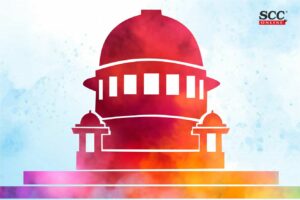Supreme Court: While dealing with a case of abetment and conspiracy for commission of criminal misconduct by public servant, the Division Bench of K.M. Joseph and S. Ravindra Bhat*, JJ., held that Section 13 of Prevention of Corruption Act cannot be invoked against a non-public servant. Clarifying the standard of suspicion to make out a prima facie case for conspiracy, the Bench stated,
“The material to implicate someone as a conspirator acting in concert with a public servant, alleged to have committed misconduct, under the PCA, or amassed assets disproportionate to a public servant’s known sources of income, has to be on firm ground.”
The instant appeal was filed by CBI against the judgment of Madras High Court by which exercising jurisdiction under Section 397 and Section 401 of CrPC, the High Court had quashed the charge sheet against the respondent-Uttamchand Bohra framed under Sections 120B and Section 109 of Penal Code, 1860 and Section 13(2) r/w Section 13(1)(e) of the Prevention of Corruption Act, 1988.
Conspiracy and Abetment
The respondent was accused of abetting and/or conspiring with the principal accused (A-1), a senior official of the Central Government in the income tax department,, so as to permit him to accumulate assets disproportionate to his known sources of income. A-1 was alleged to have acquired the flat, through the company named M/s Raviteja Trading Co. Pvt. Ltd. Two other accused, who facilitated the acquisition, turned approver. The role attributed to the respondent was that he helped in the execution of the sale deed of the property, which was seized from his house. The respondent was also involved in another case wherein the CBI had seized Rs. 50 lakhs from his vehicle when he was transporting the bribe amount received by A-1 to a safe place.
Analysis and Findings
Noticing that Section 13 of PC Act deals with Criminal misconduct by a public servant, the Bench opined that since the respondent was not a public officer or public servant, he could not be charged with committing an offence under Section 13(1)(e) read with Section 13(2) of the PCA. Further, there was no allegation against the respondent that he received any monetary or other benefit, or that he held the property in his name for the benefit of A-1. The Bench observed,
“There is no evidence against the respondent linking him to the transaction relating to the execution of the sale deed, or alleging that he had an agreement with A-1 and others to commit an illegal act.”
Further, there was no allegation of a legal act being done in an illegal manner, therefore the alleged offence under Section 120-B IPC was also not made out from the charge-sheet. With regard to the allegation of offence u/s 109 of IPC, the Bench noticed that the prosecution had not suggested that the respondent abetted A-1 to acquire disproportionate assets in any manner.
Holding that CBI could not deny that the respondent’s name was included in the instant case, although the sale deed was seized during a search conducted in earlier case, and that the FIR in the instant case named only A-1 and A-2 as the accused, the Bench stated that when the sale deed had already been seized from respondent’s house before initiating of instant case the allegations against the respondent in earlier case could not be against him in the instant case, since the two cases were separate and the earlier case was irrelevant to the instant case. Noticeably,
“He did not directly or indirectly finance the transaction by which property was sold to M/s Raviteja Trading Co. Pvt. Ltd, which, according to the prosecution, was in fact by A-1. The respondent also is not alleged to have facilitated the flow of money to fund acquisition of the flat.”
In the light of the above, the Bench opined that the fact that sale deed was in the respondent’s possession could not satisfy the ingredient of any of the offences alleged against him. Furthermore, crucially, the money trail for the property bought under the sale deed did not show his involvement. Accordingly, the Bench held that there was no material to prima facie support an inference that the respondent was either a conspirator or had abetted the commission of the offences alleged against the accused A-1. Hence, the appeal was dismissed.
[CBI v. Uttamchand Bohra, 2021 SCC OnLine SC 1208, decided on 09-12-2021]
Kamini Sharma, Editorial Assistant has put this report together
Appearance by:
For CBI: Vikramjit Banerjee, Additional Solicitor General
For the Respondent: R. Basant, Senior Counsel
*Judgment by: Justice S. Ravindra Bhat

